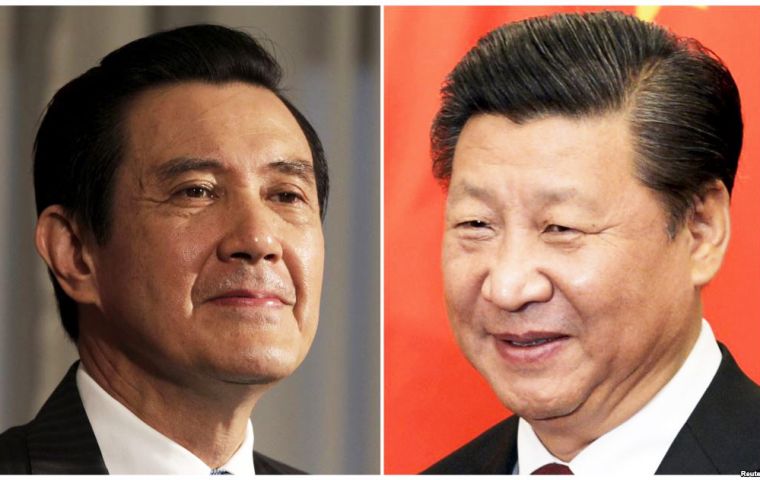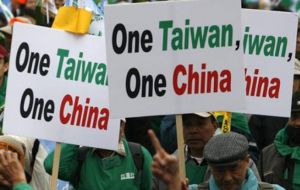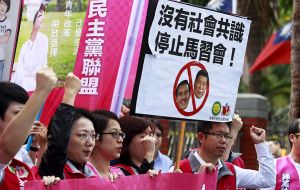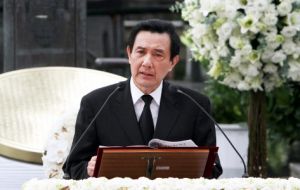MercoPress. South Atlantic News Agency
Beijing and Taiwan leaders to meet for the first time in 66 years, in Singapore
 A spokesman for Ma said no private agreements will be signed during the talks with Xi, and stressed the aim was to solidify relations between the two sides
A spokesman for Ma said no private agreements will be signed during the talks with Xi, and stressed the aim was to solidify relations between the two sides  Taiwan and China do not recognize each other and working out some agreement about how the two should address one another has long been a stumbling block
Taiwan and China do not recognize each other and working out some agreement about how the two should address one another has long been a stumbling block  In Taiwan, opposition politicians immediately voiced their concern about the talks and some called for the impeachment of Ma
In Taiwan, opposition politicians immediately voiced their concern about the talks and some called for the impeachment of Ma  Beijing emphasized how Taiwan/China relations have improved since Ma stepped into office but little mention was made of his lagging popularity.
Beijing emphasized how Taiwan/China relations have improved since Ma stepped into office but little mention was made of his lagging popularity. Just weeks before Taiwan holds general and presidential elections, Taiwan President Ma Ying-jeou announced he will hold face-to-face talks with Chinese leader Xi Jinping in Singapore. The meeting Saturday will be the first between Taiwanese and Chinese leaders since 1949 and authorities in China are predicting it will be a “major historic milestone” in the development of cross-strait relations.
In Taiwan, opposition politicians immediately voiced their concern about the talks and dozens began to rally in the capital, Taipei. Some called for the impeachment of Ma, noting that before he was re-elected to a second term in office, the president pledged to not meet with China’s leaders or discuss unification.
China claims democratically ruled Taiwan is part of its own territory and wants the two to reunify. However, support for unification with China in Taiwan is extremely low.
Democratic Progressive Party Chairwoman Tsai Ing-wen, who is also the party’s candidate in the upcoming presidential race, said she, like many others, was surprised by the announcement.
“A meeting of the leaders of the two sides across the strait is a great event, involving the dignity and national interests of Taiwan,” Tsai said. “But to let the people know in such a hasty and chaotic manner is damaging to Taiwan's democracy.”
A spokesman for Ma said no private agreements will be signed during the talks and stressed that the talks aim to solidify relations between the two sides and “keep the status quo across the Taiwan Strait.“
The governments of Taiwan and China do not recognize each other and working out some agreement about how the two should address one another has long been a stumbling block to such high-level talks.
According to Beijing state media, the “cross-strait leaders” will not address one another as president during the meeting, but instead call one another “Mister.” After holding brief talks in the afternoon, the two will hold separate press conferences and dine together in the evening.
Relations between Taiwan and China have bloomed during Ma’s tenure, but so has public concern, especially among younger voters, about the island’s over-reliance on China. Since coming to office, Ma has worked to sign 23 cross-strait trade agreements.
But even as its trade and tourism ties have grown during Ma's time in office, Taiwan’s economy has continued to struggle and there have been growing questions about just how much the island is benefiting from closer engagement with China.
An effort to push a Cross-Strait Service Trade Agreement through the legislature without a clause-by-clause review was met with strong opposition last year, when young protesters occupied Taiwan’s Legislative Yuan.
According to public opinion polls, the DPP has a strong lead over Ma’s Nationalist Party and is poised to not only win the presidential elections, but also take control over Taiwan’s legislature for the first time in the island’s history. The elections are scheduled for January 16.
How the meeting could impact the elections was not immediately clear. Bruce Jacobs, an emeritus professor at Monash University in Australia, said the meeting is unlikely to have too much of an impact.
“If anything, it could work to Tsai’s advantage,” he said, referring to the opposition DPP’s presidential candidate, Tsai Ing-wen.
Another, and perhaps more interesting question, Jacobs added, is why is President Xi meeting with Ma now?
“I think that Xi feels that his policy with respect to Taiwan is beginning to fail,” he said. “People in Taiwan are not interested and no matter what he does it is going to fail.”
Chinese state media underscored news of the talks throughout the day, highlighting that Singapore was the same location where representatives of the Nationalist and Communist Party held their first talks in 1992.
Reports also emphasized how relations between Taiwan and China have improved since Ma stepped into office, but little mention was made of the challenges and Ma's lagging popularity.
Eric Chu, the Nationalist Party’s presidential candidate, echoed China’s position about the meeting, saying the talks would be an important milestone for cross-strait relations.
In the United States, White House spokesman John Earnest welcomed the news. ”The fundamental interest of the United States is in a stable and peaceful cross-strait relationship,“ Earnest said during a regular briefing. ”But, you know, we'll have to see what actually comes out of the meeting.”




Top Comments
Disclaimer & comment rulesCommenting for this story is now closed.
If you have a Facebook account, become a fan and comment on our Facebook Page!